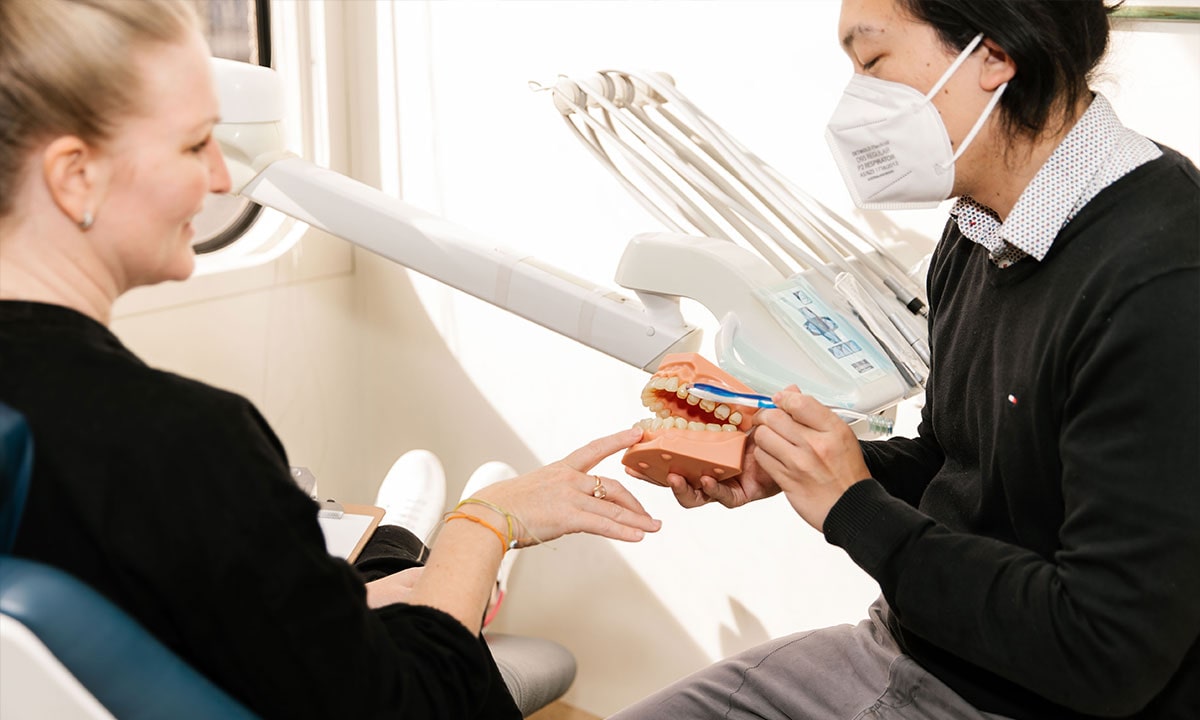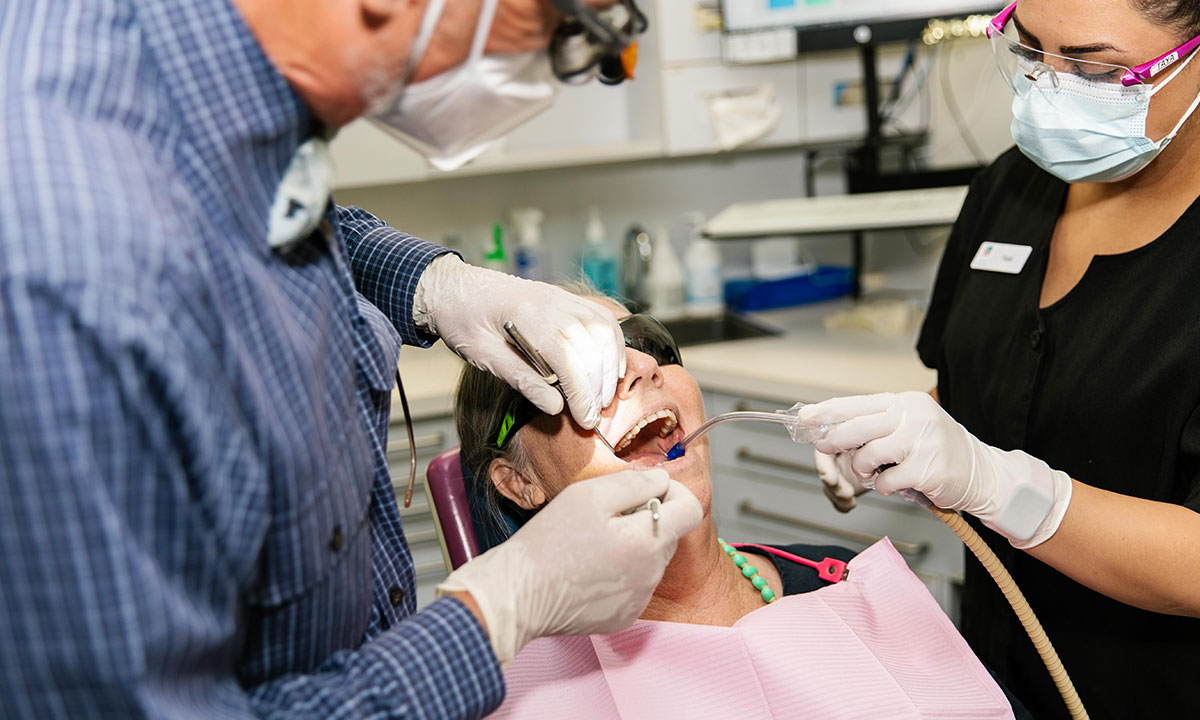Maintaining good oral health is crucial for overall well-being, and nutrition plays a pivotal role in supporting this. A well-balanced and nutritious diet not only impacts our general health but also significantly influences our oral health. In this article, we will explore the vital connection between nutrition and oral health, uncovering the key nutrients that promote healthy teeth and gums while also discussing the impact of dietary choices on common oral health issues. Additionally, we will delve into practical tips for optimising nutrition to support a vibrant and healthy smile.

A Balanced Diet for a Healthy Smile: The Link Between Diet and Oral Health
Nutrition plays a critical role in maintaining good oral health. The foods and beverages we consume impact our teeth and gums in various ways. Sugars, for example, can lead to tooth decay and cavities. When bacteria in the mouth feed on sugars, they produce acids that attack the enamel, leading to decay over time.
Acids from foods and drinks can also erode the enamel, making the teeth more susceptible to decay and sensitivity. Additionally, a diet lacking essential nutrients such as calcium, vitamin C, and vitamin D can weaken the teeth and gums, increasing the risk of oral health problems. Conversely, a well-rounded diet rich in vitamins, minerals, and antioxidants can promote oral health.
Overall, the quality of one’s diet greatly influences oral health. By limiting sugars and acids, and ensuring a diet rich in essential nutrients, you can support healthy teeth and gums, ultimately contributing to your overall well-being and smile.
Eat Your Way to Dental Health: Foods That Promote Good Oral Health
Now that we understand the crucial role of nutrition in oral health, let’s explore specific tooth-friendly foods for healthy teeth and gums. Incorporating foods that are high in calcium, phosphorus, and vitamins into your diet can significantly contribute to maintaining good oral health.
- Dairy Products: Milk, cheese, and yoghurt are excellent sources of calcium and phosphorus, both of which are essential for strengthening the enamel and maintaining the overall structure of teeth.
- Leafy Greens: Spinach, kale, and other leafy greens are rich in vitamins and minerals, including calcium, which support tooth enamel and gum health. They also contain folic acid, a B vitamin that has been linked to a reduced risk of gum disease.
- Citrus Fruits: Oranges, grapefruits, and kiwi are packed with vitamin C, which is vital for gum health. Vitamin C helps to maintain the connective tissues that hold your gums tightly against your teeth, reducing the likelihood of developing gum disease.
- Fish and Eggs: Fatty fish like salmon and mackerel, as well as eggs, are high in vitamin D, which is essential for the absorption of calcium and maintaining strong teeth and bones
- Crunchy Fruits and Vegetables: Apples, carrots, and celery can help clean teeth and remove plaque due to their crunchy texture. They also stimulate the production of saliva, which neutralises acids and helps wash away food particles that can lead to decay
By incorporating these foods into your diet, you can provide your teeth and gums with the essential nutrients they need to stay healthy and strong. Remember, a balanced diet not only supports overall well-being but also contributes to a radiant and healthy smile.

Dietary Villains: Foods That Are Harmful to Oral Health
On the other hand, certain foods can be harmful to oral health and increase the risk of tooth decay and gum disease. These dietary villains include:
- Sugary Foods and Drinks: Consuming a high amount of sugars, such as candy, soda, and sugary snacks, can provide fuel for harmful bacteria in the mouth, leading to the production of acids that attack tooth enamel and cause cavities that will eventually lead to tooth decay.
- Sticky and Chewy Foods: Food that sticks to the teeth for a long time, such as caramels, dried fruit, and sticky candies, can increase the risk of tooth decay as they can be more difficult to remove from the teeth, allowing bacteria to feed on residues and produce more acids. These acids can then erode the enamel and lead to cavities.
- Acidic Foods and Beverages: Acidic foods and drinks, such as pickles, soda, and sports drinks, can erode tooth enamel over time, making it more vulnerable to decay. Additionally, frequent consumption of acidic foods and beverages can contribute to tooth sensitivity and gum irritation.
- Highly Processed Foods: Processed foods, such as junk food, fast food, and packaged snacks, often contain high amounts of sugars, refined carbohydrates, and artificial additives that can negatively impact oral health. These foods can contribute to inflammation, weaken the immune system, and increase the risk of tooth decay and gum disease.
- Caffeinated and Alcoholic Beverages: Coffee, tea, energy drinks, and alcoholic beverages can stain teeth and contribute to the development of plaque and tartar buildup. They can also cause dry mouth, which reduces saliva production and increases the risk of tooth decay.
The Nutritional Building Blocks of Oral Health: Vitamins and Minerals
Vitamin D
Vitamin D is vital for the absorption of calcium, which is crucial for the development and maintenance of strong teeth and bones. It helps to regulate the levels of calcium and phosphorus in the body, which are necessary for the mineralization of teeth and the maintenance of healthy periodontal tissues. Without adequate Vitamin D, the body may struggle to effectively utilise the calcium present in the diet, leading to weakened tooth structure and an increased risk of dental problems.
Calcium
Calcium is a key mineral for maintaining the integrity of the teeth. It is a major component of tooth enamel, the protective outer layer of the teeth, and plays a fundamental role in keeping the structure of the teeth strong and resilient. A diet rich in calcium from sources like dairy products, leafy greens, and fortified oral health foods, helps to ensure that the teeth are adequately mineralized, reducing the risk of enamel erosion, tooth decay, and gum disease.
Phosphorus
Phosphorus, often found alongside calcium in dairy products and certain meats, is another essential mineral for oral health. It works in tandem with calcium to strengthen and maintain the structure of the teeth and jawbone. Phosphorus also plays a vital role in supporting the repair and maintenance of oral tissues, contributing to overall oral health and function.
Incorporating these specific vitamins and minerals into your diet can significantly support the health of your teeth and gums. Ensuring that you have adequate levels of Vitamin D, calcium, and phosphorus, along with a balanced and varied nutrient-rich diet, can help maintain optimal oral health and contribute to a vibrant smile for years to come.
Crafting a Tooth-Friendly Diet: Practical Tips
When it comes to incorporating oral health-friendly foods into your daily meals and snacks, here are some practical tips to consider:
- Start the Day Right:
Begin your day with a breakfast that includes dairy products, such as a yoghurt parfait with fresh fruit and nuts, or oatmeal made with milk. This will ensure that you kickstart your day with a dose of calcium and other essential nutrients for your teeth and gums.
- Snack Smart:
Opt for crunchy fruits and vegetables like apples, carrots, and celery as mid-morning or afternoon snacks. These not only provide a natural way to help clean your teeth and remove plaque but also stimulate saliva production to wash away food particles and neutralise acids.
- Incorporate Leafy Greens:
Include leafy greens like spinach and kale in your salads, smoothies, or soups. These greens are rich in calcium and other vitamins for oral health optimisation. They are also packed with nutrients to support the immune system to fight against gum disease.
- Choose Calcium-Rich Snacks:
Consider snacks like cheese sticks, a small serving of cottage cheese, or a glass of milk to increase your calcium intake between meals. These dairy options can be satisfying and beneficial for your oral health.
- Plan Balanced Meals:
When planning your main meals, incorporate foods rich in vitamin D, such as fatty fish or eggs, and pair them with phosphorus sources like lean meats or nuts for a nutrient-packed plate that supports oral health.
- Hydrate Wisely:
Instead of reaching for sugary or acidic beverages, prioritise water as your main drink throughout the day. Not only does water keep you hydrated, but it also helps wash away food particles and acids that can contribute to tooth decay.
- Practise Consistent Oral Hygiene:
No matter how well you eat, maintaining good oral hygiene is crucial. Be sure to brush your teeth at least twice a day, floss regularly, and schedule routine dental check-ups to keep your teeth and gums in top condition.
By integrating these practical tips into your daily routine, you can effortlessly incorporate oral health-friendly foods and habits, promoting a healthy and radiant smile for years to come.
Adelaide Dental Care: Your Partner in Oral Health Excellence
If you are looking for a trusted partner to guide you with dental health and diet tips to maintain optimal oral health and achieve a radiant smile, look no further than Adelaide Dental Care. Our team of experienced professionals is dedicated to providing top-notch dental care and nutritional guidance to help you achieve and maintain a healthy smile for years to come.
Take the first step towards a healthier smile by scheduling a comprehensive dental check-up with us today. Our dental experts will assess your oral health needs and provide personalised dietary advice to support your dental wellness journey.
Don’t wait to prioritise your oral health. Contact us now at (08) 8125 7350 to schedule your appointment and take the next positive step towards a vibrant and healthy smile!
Organise your next appointment today
Contact our friendly team for more information, or book directly online to arrange your next visit.

